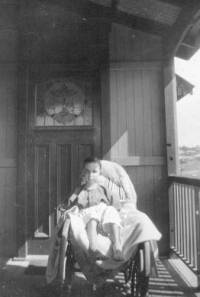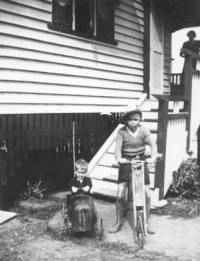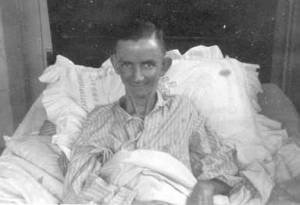To add another mouth to an already large family goes beyond simple arithmetic; life's problems are compounded. As an example, brother Kevin was convinced that Santa was going to bring him a pedal motor car for Christmas; Kev had told Santa and couldn't be persuaded to the contrary. You couldn't imagine the eruption of disappointment, the tears that drowned the little boy's face; especially since Neil, the only child up the hill, came driving down Waverley Road in his pedal motor car. It fell to Ted and Kate to explain to Kevin that Santa didn't bring pedal motor cars to poor kids.
Every one in a poor family feels the hardship in their own way. Being the eldest I guess that some things were easiest for me, in other ways things were hardest. It seems that I must have felt neglected because it is recorded that I told my mother that if she was going to have another baby I was going to clear out.
 I'm sure that Ted and Kate extended themselves to do the best to satisfy the needs of us all. But as the family becomes more numerous, and especially when the health of some of its members, parents or children, all suffer. In particular, my brother Lawrence was stricken with ulcerative colitis at age seven in 1933. Kev and I were aged ten or eleven suffered less, but the younger children, Leo and Imelda, aged three and four must have had a terrible time which I will elaborate on later.
I'm sure that Ted and Kate extended themselves to do the best to satisfy the needs of us all. But as the family becomes more numerous, and especially when the health of some of its members, parents or children, all suffer. In particular, my brother Lawrence was stricken with ulcerative colitis at age seven in 1933. Kev and I were aged ten or eleven suffered less, but the younger children, Leo and Imelda, aged three and four must have had a terrible time which I will elaborate on later.
Things were particularly difficult at times of epidemics of children's diseases. I remember when my parents, assisted by Aunt Nell, had all six of us down with whooping cough simultaneously - such a crisis is frightening for the children and the parents. Many die during the coughing spasms.
Five out the six had diphtheria at one time, two of us were hospitalised in Wattlebrae Infective disease ward. Many of the worst cases were treated in steam tents with surgery on their trachea (the wind pipe) to enable them to breathe. In the days before mass immunisation thousands of children were affected by diphtheria and dozens died. I was caught up in a second epidemic when I was hospitalised with my youngest sister, Imelda, who was only one year old. She suffered an after-affect called peripheral neuritis, one feature of which is the paralysis of the soft palate. When the poor kid drunk fluids they would be siphoned back through her nostrils into her drinking cup.
I feel sad that some parents, including trained nurses, under the banner of personal rights, frustrate the efforts of the medical authorities to carry out mass immunisation of susceptible children to the known serious, often fatal, diseases. It is not only their own kids at risk but also the kids of responsible parents. Once the non-immunised percentage of the population rises then the probability of major epidemics, which to a degree affects all children, is greatly enhanced. These anti-social parents should not be permitted to allow their children to attend kindergarten, school, or any such gathering until their children are immunised. We need a mass education on the facts of disease in this age of so-called "alternative medicine,, promoted by charlatans and the health food business which makes a fortune by preying on popular incredulity.
One compensation on being hospitalised was a little treat that my mother would prepare for us. She would set some preserved fruit in flavoured jelly, a treat we seldom enjoyed at home. It's marvellous how the remembrance of the little joys of childhood can linger a lifetime.
LONNIE
In 1933 my brother Lawrence, affectionately Lonnie, was sickly and mother noticed blood in his faeces. Lonnie made a number of visits to the over-worked honorary doctors at the Mater. The tests the hospital carried out were negative and the doctor told my mother that Lawrence was, "swinging the lead". Mother was angry because she knew that Lonnie really was a very sick little boy.
I don't remember the exact sequence of events but mother finally took Lonnie to the Royal Children's Hospital. They diagnosed two serious diseases - ulcerative colitis and rheumatic fever - both contributing to his early, and in many ways heroic, death.
Rheumatic fever is due to a common organism, a streptococci, found in the throat but is kept at bay by the normal body defences. If infected, antibiotics can usually effect a cure. But in the 1930's many, many children suffered rheumatic fever and the main treatment was bed rest and aspirin with the emphasis on-reducing the fever. Patients suffer swelling of the main joints as well as affecting other parts, including the valves of the heart.
 Ulcerative colitis is ulceration and inflammation of the large bowel. Sufferers have chronic diarrhoea with the passage of blood and mucus. There was no cure (and still is no cure) but now days there is some control of the inflammation, considerably easing the condition. It is probably genetic in origin - one of the auto-immune diseases. My youngest sister, Imelda, was diagnosed with colitis at a mature age. (Brother Leo also has multiple sclerosis which also is probably genetic in origin).
Ulcerative colitis is ulceration and inflammation of the large bowel. Sufferers have chronic diarrhoea with the passage of blood and mucus. There was no cure (and still is no cure) but now days there is some control of the inflammation, considerably easing the condition. It is probably genetic in origin - one of the auto-immune diseases. My youngest sister, Imelda, was diagnosed with colitis at a mature age. (Brother Leo also has multiple sclerosis which also is probably genetic in origin).
It was in the early 1930's when the German chemist Domagk discovered the prontosil, the first of the sulphanilamide wonder drugs, but the German pharmaceutical monopoly wouldn't release knowledge of the compounds until they had worked out all the related formulae so that they could corner the market. Lonnie was put on prontosil in late 1930's. It was reasonable for us to believe that Lonnie would have responded better if he had the 'wonder' drug earlier.
I have difficulty to find words to express my admiration for my mother and the way she stood up to the vicissitudes of life. My thesaurus suggested stoic, but no single word can convey my pride in having such a mother who, without any selfish thought, gave her life for our good. For sixteen years, from the time of Lonnie's diagnosis until his death in 1949, mother stretched her life between caring for Lonnie as well as for Ted and the rest of the family. Often she spent her days visiting Lonnie in hospital or the doctors who cared for him. Lonnie was as often in hospital as at home; as often on the dangerous ill list as in remission. At the same time mum was doing every thing that could be expected for the other five of her children.
Sometimes mother would come home from visiting hospital with a roast rabbit bought at Coles Supermarket. I liked the rabbit which was relatively cheap in those days. These days I guess you would complain that the taste of rabbit "rangy". I remember when I was about fourteen, and our mother was late, I set about boiling some rice with the help of Betty, then about nine years old. Being the eldest daughter, much was expected of Betty. We served up a soggy meal, a long way from "al dente" but we served it up with milk and sugar for Kev, Leo and Imelda.
Because he was unable to join in activities with the rest of us, Lonnie had to find his own enjoyment. He had his own mantle model radio on which he listened to horse racing. He understood form and got a lot of pleasure in laying bets with the (illegal) SP bookies. Lonnie could also get the police radio - I'll say more about Lonnie's adventures when I write more of father's political activities. Here it is enough to say that Lonnie was excited, and made us all excited, as father was shadowed all over Brisbane city by the cops and we could all follow his adventures on Lonnie's radio.
In the mid 1930's we had two cases of pneumonia. Brother Kevin had a bad lung infection which resulted in hospitalisation. They removed a rib to allow the aspiration of fluid and pus from his lung.
This was particularly difficult time for our family. As a result of worry of his miserable conditions of work, the constant calls of the debtors which ultimately caused my father, who had developed a pride in his ability to over-come adversity, to beg from his family for assistance (More of that later). Ted developed gastric ulcers and doctor ordered a diet, including fish poached in white sauce. (When they could afford the fish). They were tough times indeed.
About the same time mother had pneumonia which caused delirium. We laughed about it afterwards but she had visions of the face of the Queensland governor on the bottom of the chamber pot. The doctor expressed concern over mother's condition and since my father smoked doctor suggested to Ted that "Maybe it would do Katie's nerves good if she would take up the habit". (More on Katie's smoking later).
Brother Leo has confided in me of how he felt about his mother when, after a hard day at the hospital, and mother obviously exhausted, Mum offered to help Leo with his homework. There was little time for cuddles or a kiss from parents who are at the limits of their physical, emotional and spiritual resources.
One last remark on my early religious beliefs. The last time I remember praying to God was when I was overcome with compassion for Lonnie in my early teens. Ted and Kate had long given up prayer, but I blessed myself in bed and offered a silent prayer for Lonnie. It seemed that God never noticed.
In 1943 I was called home from the Army training camp at Wagga Wagga because Lonnie wasn't expected to survive but once again he dodged death to survive another six years. His knees and ankles were terribly swollen and blue from the lack of circulation and the resulting leg ulcers needed constant attention. It is only in retrospect that I acknowledge the selfless work of my sister, Betty, who somewhat eased the burdens on mum by taking over some of the messier jobs of caring for Lonnie.
My lasting remembrance of Lonnie is his hanging on to life, never complaining, even developing humour in the darkest times, (like 'black' jokes about some departed soul from a neighbouring bed). That is why I describe his death as heroic, for he was brave no matter what hardship or pain was thrust on him.
